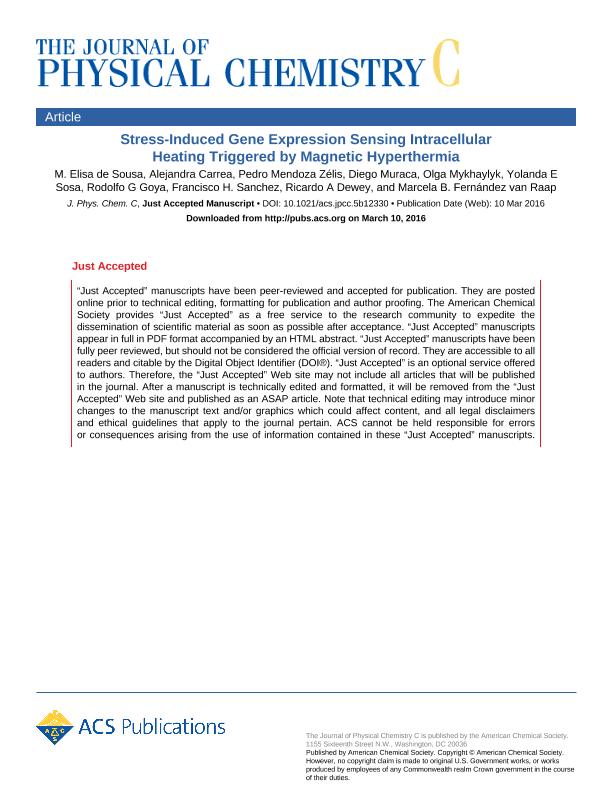Artículo
Stress-induced Gene Expression Sensing Intracellular Heating Triggered by Magnetic Hyperthermia
de Sousa, María Elisa ; Carrea, Alejandra
; Carrea, Alejandra ; Mendoza Zélis, Pedro
; Mendoza Zélis, Pedro ; Muraca, Diego; Mykhaylyk, Olga; Sosa, Yolanda Elena
; Muraca, Diego; Mykhaylyk, Olga; Sosa, Yolanda Elena ; Goya, Rodolfo Gustavo
; Goya, Rodolfo Gustavo ; Sánchez, Francisco Homero
; Sánchez, Francisco Homero ; Dewey, Ricardo
; Dewey, Ricardo ; Fernández van Raap, Marcela Beatriz
; Fernández van Raap, Marcela Beatriz
 ; Carrea, Alejandra
; Carrea, Alejandra ; Mendoza Zélis, Pedro
; Mendoza Zélis, Pedro ; Muraca, Diego; Mykhaylyk, Olga; Sosa, Yolanda Elena
; Muraca, Diego; Mykhaylyk, Olga; Sosa, Yolanda Elena ; Goya, Rodolfo Gustavo
; Goya, Rodolfo Gustavo ; Sánchez, Francisco Homero
; Sánchez, Francisco Homero ; Dewey, Ricardo
; Dewey, Ricardo ; Fernández van Raap, Marcela Beatriz
; Fernández van Raap, Marcela Beatriz
Fecha de publicación:
03/2016
Editorial:
American Chemical Society
Revista:
Journal of Physical Chemistry C
ISSN:
1932-7447
Idioma:
Inglés
Tipo de recurso:
Artículo publicado
Clasificación temática:
Resumen
It is known that alternating magnetic field applications on eukaryotic cells loaded with single domain iron oxide nanoparticles result in high hyperthermic citotoxicity leading to cell dead. Although magnetic hyperthermia therapy for cancer tumours is being developed under this idea, some in vitro assays have shown controversial results indicating that alternating magnetic field triggers large apoptotic effect without significant culture-temperature increase. In agreement with these observations a huge lowering in nanoparticle specific heating rates, when going from the colloidal suspension to cell endosomes, together with cell death, has been reported. Here, we propose a new methodology to determine the occurrence of local heating in cells when alternating magnetic fields in the radiofrequency field range are applied to cell cultures holding very low iron oxide concentrations, being these concentrations insufficient to produce a global cell-culture temperature increase up to therapeutic values. To this end, human lung adenocarcinoma cells (A549 cell line) were transduced with a lentiviral vector encoding the expression of the enhanced green fluorescence protein, EGFP, under the action of the inducible human heat shock protein 70B promoter. This modified A549 cell line was incubated with aqueous suspensions of magnetite core nanoparticles (uncoated or covered with coating agents like citric acid or silicon oxide), and exposed to radiofrequency fields. The application of an alternating magnetic field to cell cultures loaded with nanoparticles resulted in no global temperature increase but EGFP expression. Stress-inducible gene expression scales with uptake and nanoparticle properties like saturation magnetization and heat dissipation efficiency. Our analysis demonstrates that EGFP expression is linked to a localized intracellular temperature increase.
Palabras clave:
Magnetic Hyperthermia
,
Hsp70b
,
Egfp
,
Intraceullar Heating
Archivos asociados
Licencia
Identificadores
Colecciones
Articulos(CCT - LA PLATA)
Articulos de CTRO.CIENTIFICO TECNOL.CONICET - LA PLATA
Articulos de CTRO.CIENTIFICO TECNOL.CONICET - LA PLATA
Articulos(IFLP)
Articulos de INST.DE FISICA LA PLATA
Articulos de INST.DE FISICA LA PLATA
Articulos(IIB-INTECH)
Articulos de INST.DE INVEST.BIOTECNOLOGICAS - INSTITUTO TECNOLOGICO CHASCOMUS
Articulos de INST.DE INVEST.BIOTECNOLOGICAS - INSTITUTO TECNOLOGICO CHASCOMUS
Articulos(INIBIOLP)
Articulos de INST.DE INVEST.BIOQUIMICAS DE LA PLATA
Articulos de INST.DE INVEST.BIOQUIMICAS DE LA PLATA
Articulos(INIFTA)
Articulos de INST.DE INV.FISICOQUIMICAS TEORICAS Y APLIC.
Articulos de INST.DE INV.FISICOQUIMICAS TEORICAS Y APLIC.
Citación
de Sousa, María Elisa; Carrea, Alejandra; Mendoza Zélis, Pedro; Muraca, Diego; Mykhaylyk, Olga; et al.; Stress-induced Gene Expression Sensing Intracellular Heating Triggered by Magnetic Hyperthermia; American Chemical Society; Journal of Physical Chemistry C; 120; 13; 3-2016; 7339-7348
Compartir
Altmétricas



